Gratitude, Living in Rebellion, and Other Notes
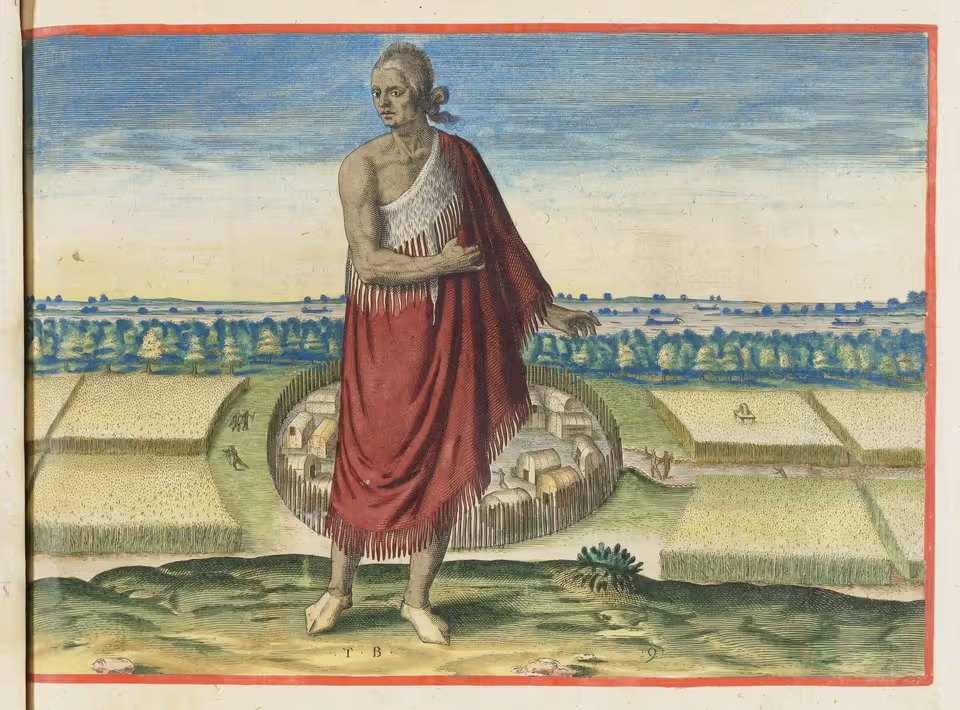
My father, fiancé, and I visited my grandma Bertha’s grave this weekend. It was the first time any of us had been back since the funeral (she died back in September), and naturally, it was hard. It was, as my father put it, “surreal,” which I took as an iteration of disbelief that this was our relationship with her now. Before, when she was alive, I would take the ferry from San Francisco in the same way. My dad would pick me up, and maybe we’d stop for lunch, but I, knowing in the back of my mind that I needed all the time I could get with Grandma Bertha at the time, always made us take it back to her house to eat.
Now, that routine, that little ritual, is gone, replaced by placing fake plastic flowers in tiny holes with old dirt on the left and right sides of her tombstone.
I wouldn’t say I’m angry because, as grandma always said, that’s life, hijo. That’s real life. But there is something sad/terrible in continually having to say goodbye or, even worse, be reminded that I’ll never say hi and ask her how she’s doing while sitting at her favorite part of the couch again. That fact, that truth, makes this process of grieving and letting go of her that much more painful. Plus, it’s the fucking holidays.
This week, I am presenting my essay, "Gratitude: The Quiet Act of Rebellion." I won’t preface it; instead, you should just read it. Cheers and happy holidays.
Gratitude: The Quiet Act of Rebellion
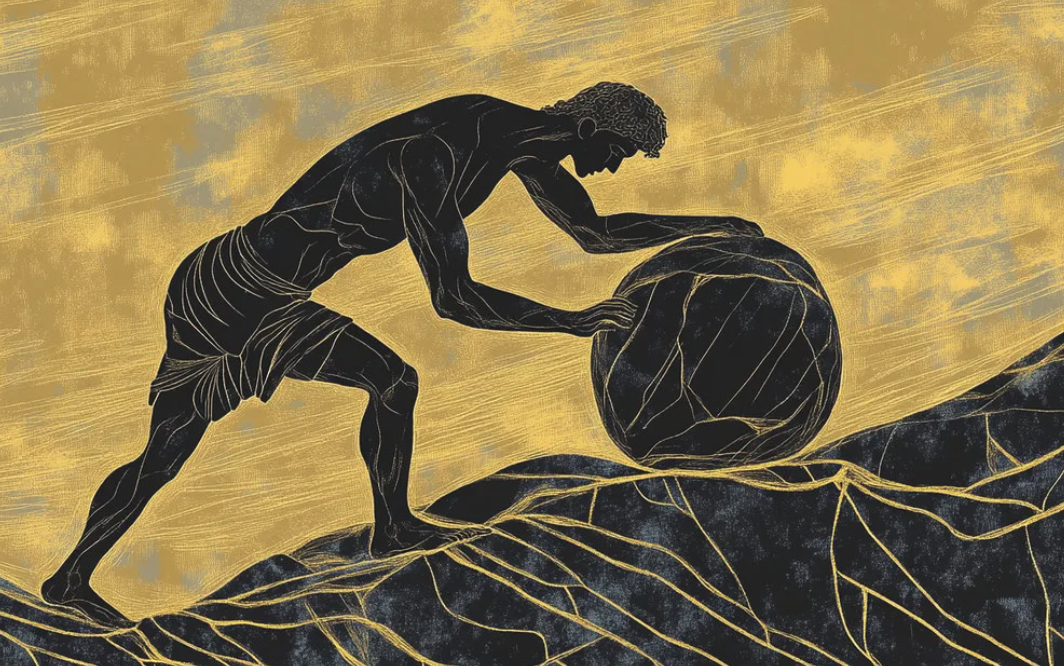
On my work and writing desks (technically the same thing, but, given the task/activity, very different in my mind) is a pretty lame statue I bought from Amazon (sorry) of two thin figures pushing a single boulder up a slanted slope. They’re slim, skinny, almost alien-like, and nothing like me physically. The massive rock these two are pushing is large and wide with a crack in it, lumpy, very much like me.
Seeing two of these figures, I should denote who they are specifically in my mind: it's me today and my younger self many years ago. Please don't get too weepy now, but in many ways, I miss that rapscallion, that dare-do-well who had a few things to lose but many more things to gain, which is why I wanted some totem to remind me of him day to day. But the main reason I have this cheap statue on my desk is for encouragement. Some days, when nothing is there, no idea, no emotion, no words arrive, I need something to dig me out of the funk I’ve found myself in. So, I look to this corny thing below in times of need to really push my present self up to where I need to be today, which, having lived in life now for 36 years, feels harder than before. Somedays, though, the leader is the present-day me, and it’s me looking back at my younger self, lost and weird, to feel good about how far I’ve come.
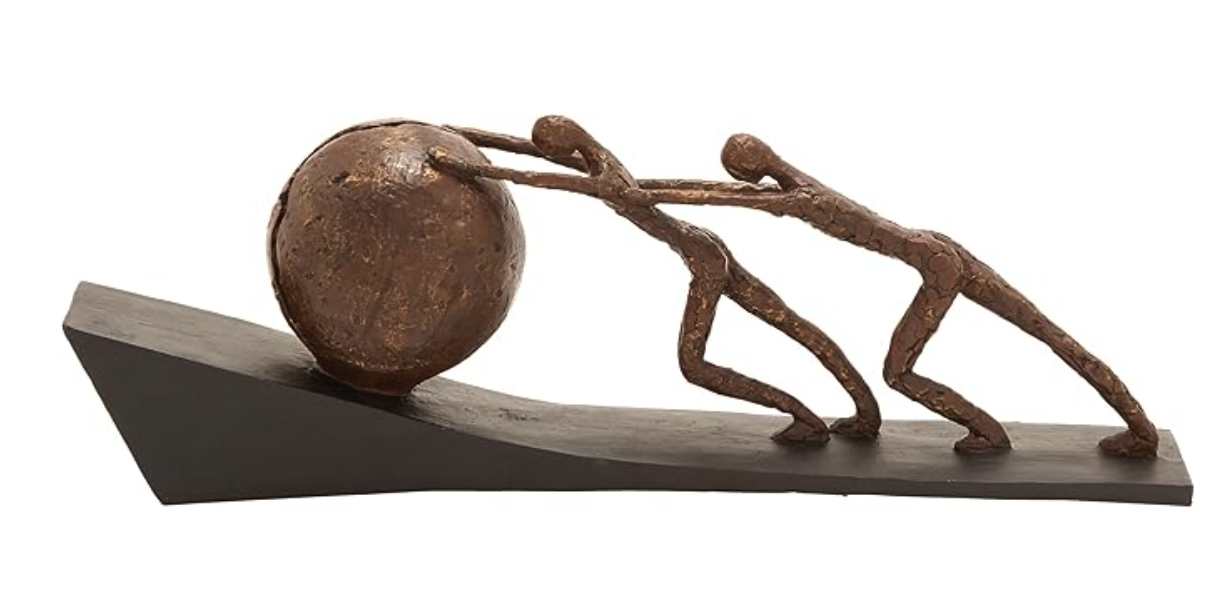
If you didn't know already, the statue is based on the myth of Sisyphus, a legendary tale from Greek mythology about a cunning king who was punished by the gods for an eternal, futile task to push a massive boulder up a mountain, only to watch it roll back down each time he neared the top. Only the king is in the myth, so I'm curious why the artist decided on two. Anyways, about the myth, I'm sure we can all relate to the king's struggle, be it in the way you may stare glazed at the same tasks every week, making the same over easy eggs before the same commute and the same activities afterward, or maybe how even your favorite music or song no longer brings out the same level of emotion as it once did. Just me? If so, that would make me happy, seeing it’s not the best rut to be stuck in.
But I see it as a natural thing, very much in life, but hard to accept and see/feel at length, which led me to seek answers and remedies to feel better and return to a place of gratitude. This brought me to Albert Camus's philosophical essay, The Myth of Sisyphus, a great read and view of the absurdity of man's life mirroring Sisyphus the king's situation and how, despite its apparent torture, how gratitude, in the face of all this, may be the perfect form of rebellion.
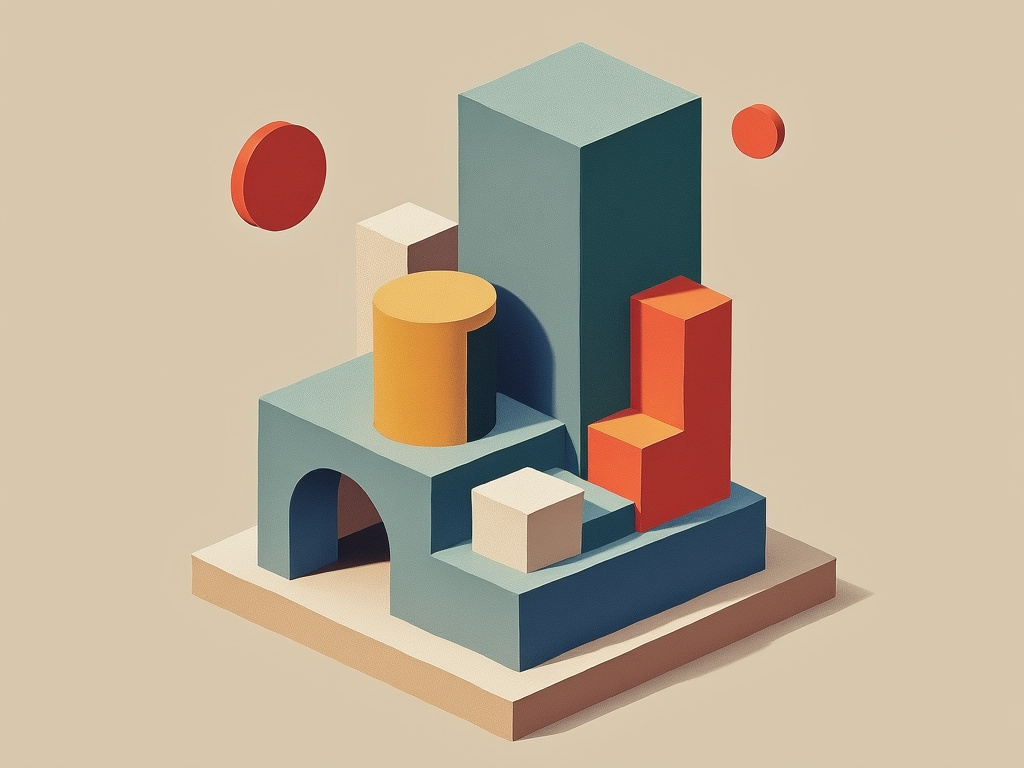
Now, what do I mean by that? Camus's essay aims to look at what he calls "the absurd," the unsettling stroke of untouchable tension between our human desire for order and purpose (some would say meaning), and comprehending the question, what the hell are we even doing here? While faced with the silent, indifferent universe that offers no clear reasons for our existence, such a question is tricky, especially when nothing or no one answers. Many mornings and nights, I've woken up or finished work and asked myself, what did I do today? What will I do tomorrow? For what? For who? For what end goal? Why? It's a scary place to find yourself, especially when faced with the cold existential threats across most forms of media, be it politically, or from the barrage of videos and news we see from flooding/fire/general natural collapse, or within the jaws of corporate capitalism that appears hell-bent on optimization via AI algorithms that have no answer but to make money to survive that ends up contributing to these powers that be.
Where does my little desk totem come into all this is this? If life presents no objective meaning (I'm sure you can imagine all the subjective ways people create meaning via religion, writing, work, sports, etc.), shouldn't we find the cheapest rope and have one more final hang? Dark, I know, but darkness is where we must look to gain any headway here, especially when you consider the suicide rate in the US among males increased by 4.5%, from 22 deaths per 100,000 in 2020 to 23 per 100,000 in 2022, while rising by 7.2% among females during that period, from 5.5 to 5.9 per 100,000. It's an issue, just one we're not talking about on major news media. To me, at least, the Myth of Sisyphus offered a more hopeful—though demanding—lifeline for a community immersed in this dilemma. In confronting the absurdity of seeking meaning, we must acknowledge that no ultimate value lies in the outcome. Instead, purpose resides in the struggle: the personal liberation, integrity, and gratitude found by simply engaging in the task and being grateful for the opportunity to do so.
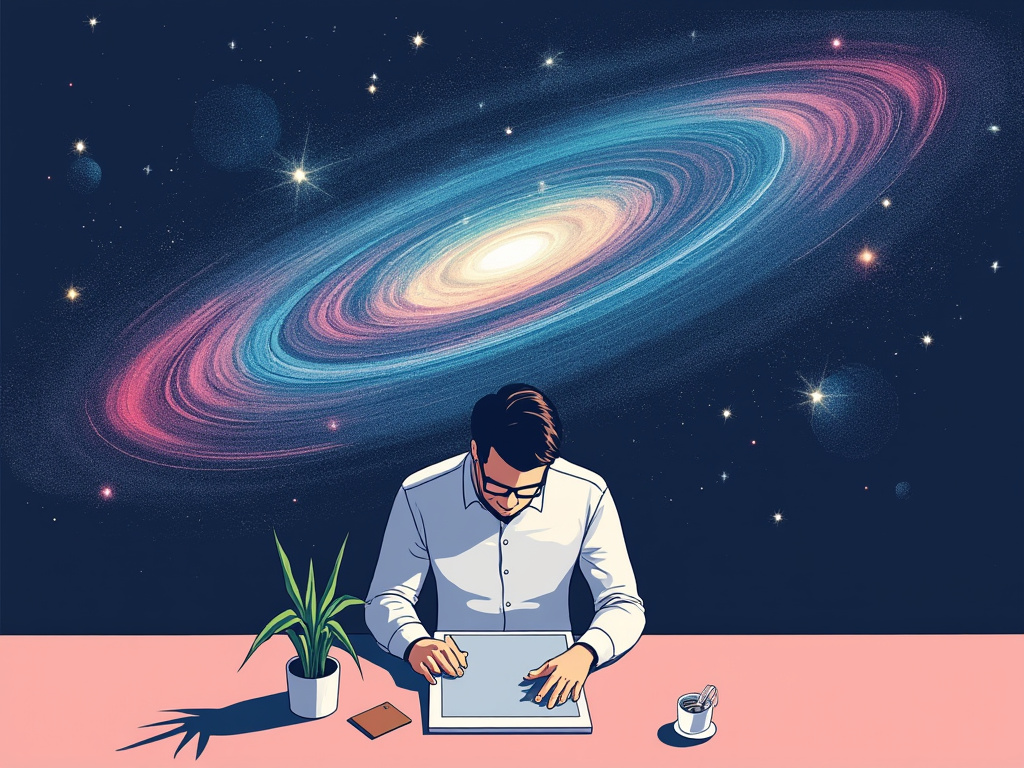
The universe will never grant you 100% fulfillment on your final day at the office. That last golf putt you made with the boys on Sunday? You will want another one. After that, another one. Maybe (and I don't have kids) walking your child down the aisle to get married is the ultimate reward that needs no further push, that maybe tells you in some way you have succeeded in your duty as a parent. That could be the mountaintop, but aren't some also looking to improve their kid’s married life afterward?
A new slope, a new hill, a new boulder, another push. A new peak to look at, dream about, and maybe die fantasizing about - as so many do without taking the first leap - even though they have done it a million times before. A rebirth, without the birth, without the immortality.
To confront the absurd in Camus's definition, which we consciously know can never be conquered, only continued with, one must acknowledge head-on that there are no final answers and no neat conclusions - no finality - a stance I’ve come to realize is genuinely based on the natural world. Have you ever looked at a mountain and said, That is finished? A poem, if you've ever written one, must sit and be returned to, as it is never finished, just as a stone is never quite polished or worn down to its state of Earth over time, even as the power of the river moving and changing it remains. A poem is never finished because it can never be truly completed, just as our search for meaning (which leads, in Camus’ mind, to meaninglessness) never truly ends. This can become a virtue if we view it as a gift as a boulder to be pushed uphill every day.
Because with each revision to make the task easier, each subtle shift in tone or imagery of one’s life, a push or pull of that or this is, in itself, one's hands readjusting themselves as they push the metaphorical boulder another inch up the hill. This is where Camus's words, "one must imagine Sisyphus happy,” feel most true, most real, most in rebellion against the exploitive marketing systems of capital and politics that have convinced us we are doing this for the sake of that when really, we are simply doing what we are doing because of no greater purpose other than the act itself.
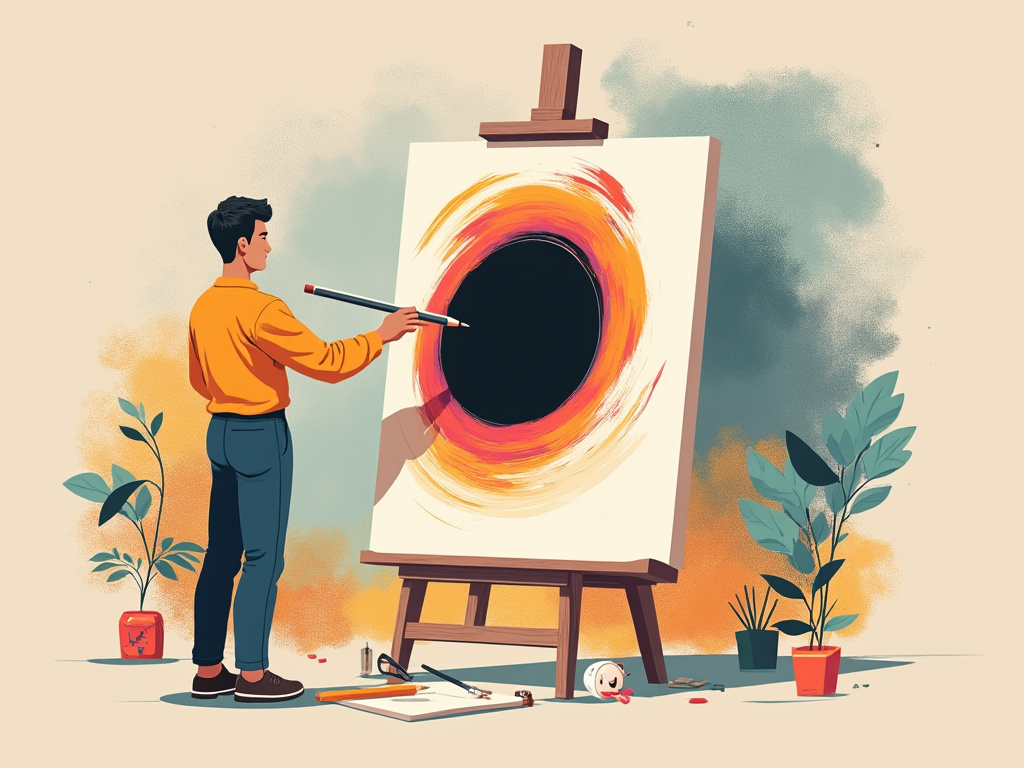
And seeing I am a writer with aspirations and the goal to get back in and work on fiction again, let me pivot there. The best works I’ve read (and hope to produce) are like carefully crafted paintings. They can capture a moment in time like the light of singular dawn or dusk of a given day only from the materials one has, be it lead and chromium or spit and saffron. For me, that feat of expression is gratitude in its purest artistic form when confronted with the absurd. Creation in the face of meaningless is rebellion, and when the work is so good that future readers or viewers want to be there in it—not because it offers closure, but because it crystallizes life's beauty so well- that feels gratitude being passed on. When you embrace action and steep it in appreciation, it feels like you are tapping into a continuous process of becoming—reflecting the freedom Camus finds in confronting the absurd. Here, no final purpose is granted, and no meaning is imposed; instead, you find yourself perpetually reworking creation as it is given to yourself daily.
So today, even though it may harder tomorrow, I am going to try to rebel against the absurd with gratitude: grateful that I have this body, this mind (however much abuse and pain I put it through), this setting, this place, this desk, these fingers, this keyboard, and the time to be able to transmute my experiences with the will and energy to create it to get it down, as I am doing right now, for others - even if just one person - to read. And nothing needs to come of it except the possible generation of new ideas and feelings—or, better yet, the resurgence of old ones, long thoughts lost.
When we strip away grand illusions or transcendent assurances about any action, task, or goal, we stand exposed, like a newborn, before the ceaseless struggle that is nothing more than life unfolding, moment by moment.
So You've Decided to Become Isolated & Weird Newsletter is a reader-supported publication. To receive new posts and support my work, consider gifting a sub to friends/family!



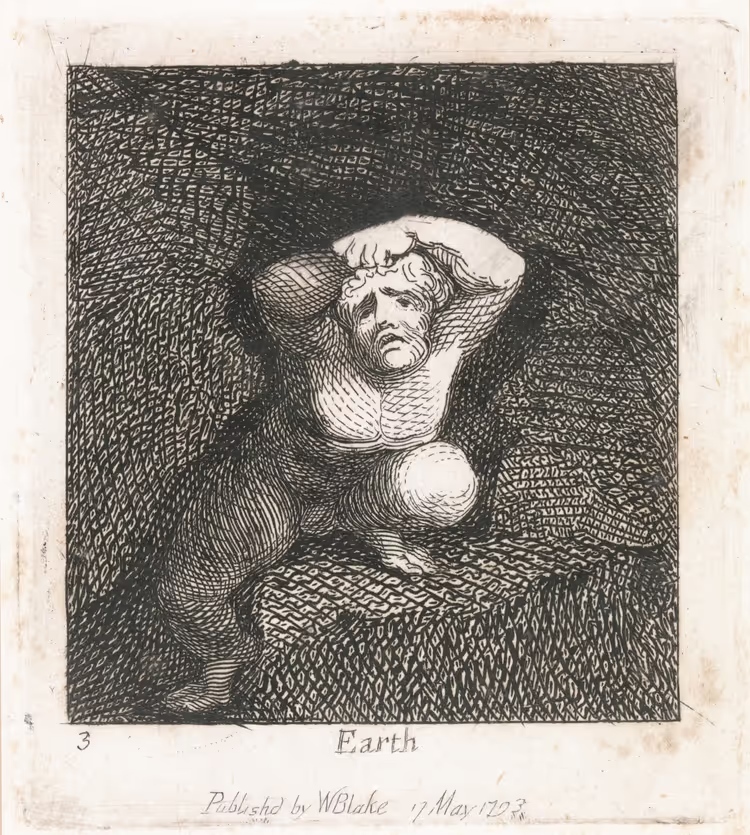
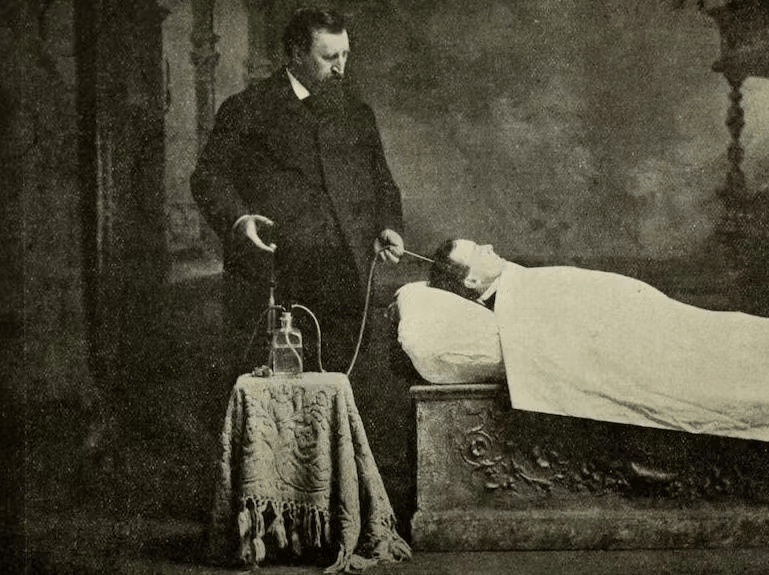
Member discussion